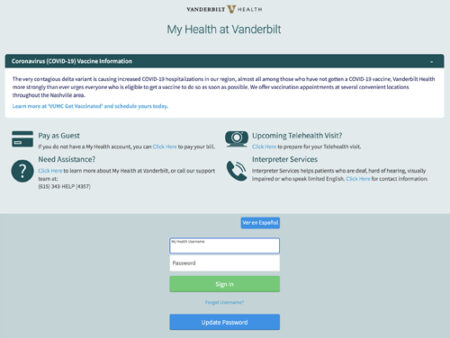by Paul Govern
Vanderbilt University Medical Center patients are overwhelmingly in favor of having immediate electronic access to their clinical test results, recent surveys show.
A federal rule in effect since April 5 was designed in part to ensure that patients are given electronic access to their health information upon their request and at no cost, including, with very few exceptions, immediate access to any clinical test results.
At VUMC, secure patient access to electronic health records (EHR) is provided through a patient portal, My Health at Vanderbilt (MHAV).
“We previously released most test results to the portal within days of their hitting the EHR, with longer delays for certain results that we thought could potentially pose distress for patients if viewed without the context that a clinician can provide,” said Trent Rosenbloom, MD, MPH, director of MHAV. “While the federal rule met with trepidation from some quarters, our survey results are very clear: most patients appreciate having the ability to see their test results the moment they come into the electronic record, rather than wait to be contacted by their health care team.”
Some 94% of VUMC patients said they would like to receive test results immediately, even if it means they do not first get the chance to connect with their doctor or nurse.
Some 82% looked at test results prior to communication with their doctor or nurse and doing so caused worry for only 6%.
Early in the COVID-19 pandemic and somewhat ahead of the new federal rule VUMC decided to release COVID tests immediately to MHAV users.
Some 95% of patients tested for COVID found the experience of viewing their test result in MHAV not very confusing or not confusing at all.
When new information is posted to VUMC health records, MHAV users by default receive an email notification. As reported recently in JAMA Network Open by research fellow Bryan Steitz, PhD, and colleagues, as a result of the new regulation, it happens that MHAV users review their test results before their ordering clinicians do roughly half the time.
Under the federal rule, more health systems have also begun sharing clinical notes with patients — a practice called open notes.
“Open notes were something of a bugaboo for some clinicians,” Rosenbloom said, “but well before the rule came into effect, studies had established that everyone benefits from the greater transparency this provides to patients.”
Two surveys have been conducted regarding immediate test results reporting in MHAV.
In March through October of 2020, 1,390 MHAV users were surveyed with regard to COVID test results; led by Rosenbloom and former VUMC clinical informatics fellow Robert Turer, MD (now at UT Southwestern Medical Center), this survey was reported in Applied Clinical Informatics.
In August of this year, another survey was sent to 3,713 participants in Advise Vanderbilt, an online community of VUMC patients who provide feedback related to their experience with the health system.